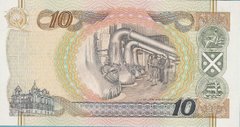England, Wales, Scotland, and Ireland comprise the home nations of rugby (union) football. Their national squads have played each other in an annual tournament since the 1880s, and the team winning all their matches is said to have claimed the Triple Crown. This tournament--because it included France--was known for most of its history as The Five Nations. A team winning all four of its matches was said to have completed a Grand Slam. Italy joined the fun in 2000, and the competition is now called The Six Nations and, being sponsored by the Royal Bank of Scotland, can be found at RBS6Nations. Each team in the tournament plays five matches, one against each opponent. It is possible, then, to have more than one team claim the top spot on the leaderboard, with, say, identical 4-1 or 3-2 records. Points difference is then the decider, and that squad is named champion, and they are presented with the Official RBS 6 Nations Championship Trophy.
Often during the long history of this competition, teams have won a Triple Crown but failed to get a Grand Slam or a Championship. Or won the Championship without a Triple Crown or Grand Slam! In 1985, the Irish won the Triple Crown and the Championship (it was still Five Nations) but not a Grand Slam. Today, on the first full day of spring, Ireland won the whole salami by beating Wales 17-15 at Millenium Stadium in Cardiff. It is a three-in-one victory: Triple Crown, Grand Slam, 6 Nations Trophy. The Irish Rugby Football Union uses the shamrock--the three-leaf clover of Ireland--on its logo. Today the I.R.F.U., the team, and their fans get to celebrate a tenth Triple Crown, a second Grand Slam (first since 1948!) and a first-time-ever Six Nations title.
Three-in-one on 3/21.
WTF
-
The Giants are supposedly bringing in Luis Arráez to play second base. I
used to say I would "take anyone on a one or two year deal" but this is a
real h...
2 weeks ago







No comments:
Post a Comment